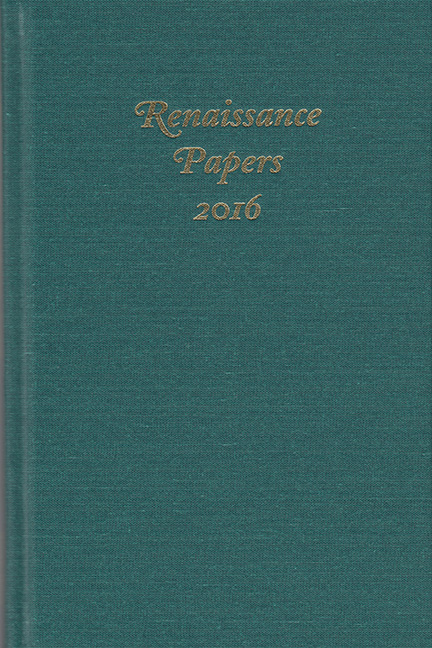Book contents
- Frontmatter
- Contents
- Renaissance Papers
- Beyond Recognition: Mutilation, Marginalia, and the Vicissitudes of Reading
- Velázquez as Reader and the Pictor Doctus in Early Modern Spanish Art
- “Out of this silence yet I picked a welcome”: The Audience in A Midsummer Night's Dream
- Uncommon Justice: The Secret Knowledge and Sagacious Judgment of Old Escalus
- Boundaries in a Globalized World: Shakespeare's Antony and Cleopatra
- Imitation, Innovation, and Imperium: The Grammar School Education of Lear's Daughters
- Violent Brothers, Deadly Antifeminism, and Social Suicide in The Revenger's Tragedy and The Duchess of Malfi
- Canon Fodder: Notes on Don Quijote
Canon Fodder: Notes on Don Quijote
Published online by Cambridge University Press: 23 August 2019
- Frontmatter
- Contents
- Renaissance Papers
- Beyond Recognition: Mutilation, Marginalia, and the Vicissitudes of Reading
- Velázquez as Reader and the Pictor Doctus in Early Modern Spanish Art
- “Out of this silence yet I picked a welcome”: The Audience in A Midsummer Night's Dream
- Uncommon Justice: The Secret Knowledge and Sagacious Judgment of Old Escalus
- Boundaries in a Globalized World: Shakespeare's Antony and Cleopatra
- Imitation, Innovation, and Imperium: The Grammar School Education of Lear's Daughters
- Violent Brothers, Deadly Antifeminism, and Social Suicide in The Revenger's Tragedy and The Duchess of Malfi
- Canon Fodder: Notes on Don Quijote
Summary
There's no continuity between the two installments of Don Quijote that were published ten years apart—part 1 in 1605 and part 2 in 1615. Similar episodes appearing in both parts are often distinguished by the radical differences of context and atmosphere. Though in its concluding chapters the mood of part 1 approaches that of part 2, the two installments are separated by a quantum jump that closes off the world and order of the first from those of the second.
Cervantes's attention to the serious problems of life is clearly more intense and unremitting in part 2. By “serious problems” I don't mean pratfalls, broken ribs, and missing teeth, which are scattered throughout part 2 as well as part 1. Rather I mean hurt feelings and insecurity; the failure of trust and communication; the breakdown in human relations occasioned by bad faith, lack of self-control, and loss of respect for self and others. At the sociopolitical level, these serious problems are connected in part 2 with poverty, lawlessness, war, the decadence of a bored and idle aristocracy, and the eviction of the Moors from Spain.
Since the differences between the two parts are compactly illustrated in their respective prologues, I'll begin by comparing them. Most of the first prologue is given over to poking fun at the pedantry and elaborate fanfare with which authors of the time decked out their books: sonnets, epigrams, eulogies; marginal glosses; the liberal citation of biblical and classical texts; the lip service paid to authority; the extravagant display of useless learning. Cervantes pretends that while he's despairing over his inability to write a proper prologue, a friend comes in “unexpectedly” and saves him by suggesting a simple expedient: “If you can't get anyone to write commendatory verses, write them yourself and palm them off on someone else.” Here he cites two outlandish candidates, Prester John and the emperor of Trebizond (C27).
“As for citing in the margins,” he continues, “all you have to do is throw in a few pat phrases or bits of Latin that you know by heart, and someone is sure to take you for a scholar. To make footnotes possible, work some footnote-worthy references into the text. If you want to refer to authors who will lend authority to your work, simply find a book that cites them all from A to Z, beginning, of course, with Aristotle.
- Type
- Chapter
- Information
- Renaissance Papers 2016 , pp. 103 - 131Publisher: Boydell & BrewerPrint publication year: 2017

